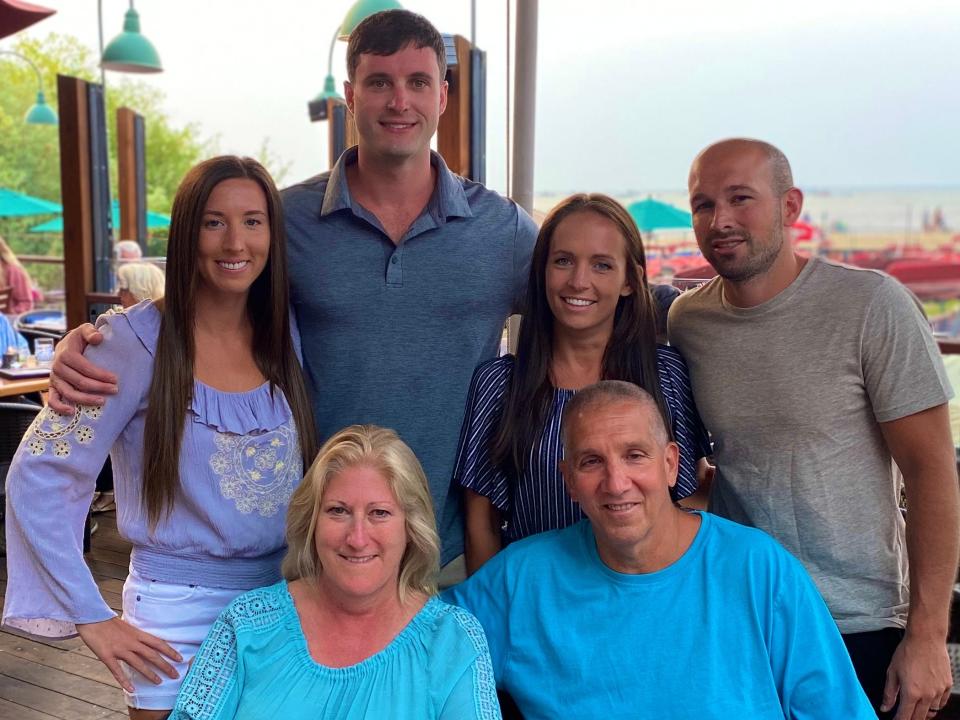A 21-year-old had a stroke at graduation as a rare side effect of birth control. She wants people of all ages to know the signs and risk factors.

Marissa Fattore, 21, had a stroke at her graduation ceremony.
The student athlete had a blood clot possibly caused by her birth control.
Fattore wants to raise awareness that strokes can happen at any age.
On her college graduation day, Marissa Fattore woke up feeling "off."
The 21-year-old had expected May 18, 2013, to be a happy day: she was graduating from Kutztown University of Pennsylvania alongside her sorority sisters and she'd enjoyed her time at college, where she'd been a gymnast and collegiate swimmer.
But Fattore had a sharp headache and a strange fuzzy sensation in her head, which she brushed off as pre-graduation nerves, she told Business Insider.
"Surely everyone had to feel a little bit off on such a big day," she thought.
So she "pushed through" to the afternoon ceremony, battling the headache as she walked across the stage to collect her diploma before rejoining her classmates.
But that's the last thing she remembers of that day, because Fattore collapsed to the floor when she returned to her seat.
"Things went dark for me, and the next thing I knew, I was waking up in the hospital," she said.
Fattore, who had been an athlete all her life and never smoked, had suffered a stroke.

More young people are having strokes
Strokes can happen to anyone at any age, and although fewer people in the US are having strokes overall, the number of people aged 18 to 45 being hospitalized by them has spiked by more than 40% in the last few decades, according to the American Heart Association.
Certain factors can increase a person's risk of stroke, including being Black, being a woman, having high blood pressure, high cholesterol, or diabetes, smoking, and being overweight.
"It's really important for people to understand their personal risk factors and family history of stroke, to reduce their own risks and to educate themselves on the signs and symptoms of stroke because it could help save someone else's life," said Fattore, who is sharing her story as part of the AHA's Go Red for Women Class of Survivors.
Fattore had a rare form of stroke, possibly caused by her birth control
Fattore was rushed from her graduation to hospital, where tests revealed she had a blood clot in her brain that caused a rare form of stroke called cerebral venous sinus thrombosis. CVST occurs when blood clots block the venous sinuses in the brain, stopping blood from draining out.
Fattore was prescribed anti-clotting and anti-seizure medication, which helped stabilize her, but she wasn't responsive for the first 24 hours of her hospital stay.
"My family recalls me squeezing their hands or just smiling when they would ask me simple questions. I eventually woke up with doctors around me, and I didn't know how I got there or what had happened," she said.

Doctors surmised that the estrogen birth control pill Fattore was on at the time may have caused the stroke because she didn't have any other risk factors or any genetic predispositions that doctors could identify.
Blood clots are a rare side effect of estrogen birth control, which don't outweigh its benefits, Dr. Pratima Gupta, assistant professor in the Department of Obstetrics, Gynecology, and Reproductive Sciences at UC San Diego Health, previously told BI. No more than 10 in 10,000 people a year develop blood clots as a result of being on birth control, according to Cleveland Clinic, compared to the 1 to 5 per 10,000 people who develop blood clots each year and aren't on hormonal birth control.
Fattore had to learn to speak and walk again
After being in hospital for around a week, Fattore was transferred to a physical rehabilitation center.
There, she did physical and speech therapies "to learn how to walk, talk, and function as a person again," she said.
"While it was physically taxing on my body, I think the mental side of it was tougher for me. I just didn't understand how this could happen to me, and I was terrified. I had this big fear that I wasn't gonna return to the way I was before and that I would have lifelong deficits," she said.
With age on her side, Fattore recovered quickly, and she left the rehab center in June 2013, a month after she arrived. It took her a further year to fully recover and come off her anti-clotting medications.
Fattore will have to take seizure medications for life, but she has been able to move across the country and return to normality.

Symptoms of stroke include weakness on one side of the body and a severe headache
Since her stroke, Fattore has implemented lifestyle changes to maintain a healthy cardiovascular system, including staying active; eating a healthy diet full of whole grains, lean proteins, fruits, and vegetables; not smoking; getting eight hours of sleep a night; and monitoring her blood pressure.
She wants people to know that cardiovascular disease can happen to anyone and that learning the warning signs could help save a life.
Spotting the signs of a stroke early and acting quickly is important because the earlier a stroke is treated, the higher the survival rate and the lower the disability rate after the event.
"Remember the acronym FAST," Fattore said, which stands for Face drooping, Arm weakness, Speech difficulty, and Time to call 911.
Other warning signs of a stroke include:
Numbness/weakness on one side of the body
Confusion or trouble understanding speech
Having trouble seeing
Having trouble walking, loss of balance or coordination
A severe headache with no known cause
Read the original article on Business Insider

